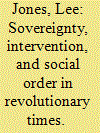| Srl | Item |
| 1 |
ID:
145373


|
|
|
|
|
| Summary/Abstract |
Iran-Israel relations have lifted from close ties between Iran and Israel during the phase of the Pahlavi dynasty to hostility since the Revolution and ending of Gulf war. The most contentious issue of the Iranian-Israeli conflict is Iran’s nuclear project. The Israeli fear of an Iranian version of a “final solution” might push Israel to launch a preemptive strike against Iran. However, just one blow might not be enough, considering the various measures Iran implemented in order to protect her nuclear setup. Israel should therefore be ready for a long struggle, in which the rear of both sides would be hit. Israel could be part of a vast anti-Iranian coalition, including Arab states that are also on alert, fearing Iran’s ambitions, particularly after losing Iraq as their shield.
|
|
|
|
|
|
|
|
|
|
|
|
|
|
|
|
| 2 |
ID:
124136


|
|
|
|
|
| Publication |
2013.
|
| Summary/Abstract |
This article explores how sovereignty and (non-)intervention are implicated in the (re)production of specific social orders. Sovereignty and the non-interference principle circumscribe 'domestic' politics from 'the international', defining who is legitimately included or excluded from the struggles that determine political and social orders. State managers seek to admit forces and resources favourable to the order they are seeking to create, whilst excluding those deleterious to it. In revolutionary periods, however, these attempts to 'cage' social relations often crumble as transnational forces engage in fierce, multifaceted conflicts overlapping territorial borders. In such circumstances, both norms of non-interference and practices of intervention may be used by dominant forces to help contain the spread of sociopolitical conflict and to strengthen their hand in the struggle to (re)define social order. Sovereignty regimes are thus shaped by the strategies and ideologies of the various social groups locked in conflict at a particular historical moment. This argument is illustrated through the case of Cold War Southeast Asia, where sovereignty and intervention were both used to stabilise capitalist social order and curtail transnational, radical threats from below.
|
|
|
|
|
|
|
|
|
|
|
|
|
|
|
|